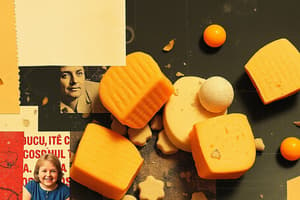Podcast
Questions and Answers
What are carbohydrates?
What are carbohydrates?
Saccharides or sugars, either single monomeric units or polymeric chains.
Which of the following is a monosaccharide?
Which of the following is a monosaccharide?
- Lactose
- Starch
- Sucrose
- Glucose (correct)
Carbohydrates cannot be hydrolyzed into simpler forms.
Carbohydrates cannot be hydrolyzed into simpler forms.
False (B)
What are the components from which carbohydrates are formed?
What are the components from which carbohydrates are formed?
What type of linkage is formed in lactose?
What type of linkage is formed in lactose?
Which of the following is an example of a disaccharide?
Which of the following is an example of a disaccharide?
What are polysaccharides?
What are polysaccharides?
What is starch primarily composed of?
What is starch primarily composed of?
What is an example of a homopolysaccharide?
What is an example of a homopolysaccharide?
Match the following carbohydrates with their types:
Match the following carbohydrates with their types:
Study Notes
Carbohydrates
- Carbohydrates are organic compounds also known as saccharides, sugars or sugar units with varying structures:
- Monosaccharides: Simple sugar monomers like glucose and fructose
- Disaccharides: Sugar polymers formed from two monomers including sucrose, maltose, and lactose
- Polysaccharides: Sugar polymers with over ten monomers including glycogen, starch, amylopectin, dextrins, and cellulose.
Classification of Carbohydrates
- Monosaccharides can be classified by:
- Number of Carbon Atoms: Trioses (3C), Tetroses (4C), Pentoses (5C), Hexoses (6C)
- Functional Group: Aldoses (contain an aldehyde group) or Ketoses (contain a ketone group)
Examples of Monosaccharides
-
Trioses:
- Glyceraldehyde (Aldose)
- Dihydroxyacetone (Ketose)
-
Tetroses:
- Erythrose (Aldose)
- Erythrulose (Ketose)
-
Pentoses:
- Ribose
- Deoxyribose
- Ribulose
-
Hexoses:
- Glucose
- Galactose
- Mannose
- Fructose
Disaccharides
- Disaccharides are formed by the condensation of two monosaccharide units.
Examples of Disaccharides
- Maltose: A disaccharide that upon hydrolysis yields two glucose molecules.
- Sucrose: Also known as cane sugar, beet sugar or table sugar. Sucrose is formed by the condensation of glucose and fructose.
- Lactose: Also known as milk sugar. Lactose is a disaccharide that forms upon the condensation of galactose and glucose.
Oligosaccharides
- Condensation products of two to ten monosaccharides.
Polysaccharides
- Condensation products of more than ten monosaccharides. They can be either linear or branched polymers.
- Important examples:
- Starch
- Glycogen
- Dextrins
- Cellulose
Homopolysaccharides
-
Starch:
- A homopolysaccharide formed from a-glucose units.
- The main carbohydrate present in plants like barley, rice, maize, wheat, and potatoes.
- Not present in animal tissues.
- Exists in granules.
-
Dextrins:
- Produced by the enzymatic hydrolysis of starch.
Studying That Suits You
Use AI to generate personalized quizzes and flashcards to suit your learning preferences.
Related Documents
Description
This quiz covers the fundamental aspects of carbohydrates, including their definitions, classifications, and examples of monosaccharides. You'll explore the different types of sugar units, from simple glucose to complex polysaccharides. Test your knowledge and deepen your understanding of these essential organic compounds.




